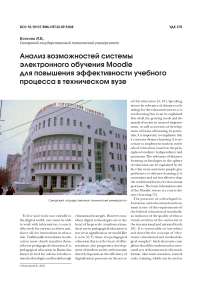The analysis of the possibilities of e-learning system Moodle to improve the efficiency of the learning process in a technical university (in English)
Автор: Vlasova Irina V.
Журнал: Высшее образование сегодня @hetoday
Рубрика: Дидактика высшей школы
Статья в выпуске: 9, 2022 года.
Бесплатный доступ
The possibilities of the Moodle environment in improving the efficiency of the educational process are determined. The Moodle system is considered as a specially organized educational environment that promotes the development of students’ competencies and implements the main goals of information and communication technologies. The use of the Moodle system in the educational process allows students to form the ability for independent search, continuous self-education and creativity. Attention is focused on the importance of independent work of students. The description of the electronic educational and methodological course “English for students of technical specialties” in the discipline “Foreign language” for teaching students of technical specialties is given. It is concluded that the electronic educational system can be used as a supplement to classroom work. Students can use the system to independently master any materials and fill in gaps in their knowledge.
Distance technologies, self-education, moodle system, test, electronic educational and methodological complex, course element
Короткий адрес: https://sciup.org/148325981
IDR: 148325981 | УДК: 378 | DOI: 10.18137/RNU.HET.22.09.P.038
Текст научной статьи The analysis of the possibilities of e-learning system Moodle to improve the efficiency of the learning process in a technical university (in English)
To live and work successfully in the digital world, one must be able to work with information, to use it effectively for various activities and, above all, for innovations in education. Traditionally innovations in education most clearly manifest themselves in pedagogical education. It is pedagogical education in Russia has always strived for advanced educational technologies and breakthrough educational strategies. However, now, when digital technologies are at the head of large-scale transformations, their use in pedagogical education is not yet as significant as we would like it to be [6; 7]. Since it is pedagogical education that is at the heart of all innovations, the progressive development of modern society and economy directly depends on the efficiency of digitalization processes in the sector of this education [5; 10]. Speaking about the relevance of distance technology for the education system, it is worth noting that it can be explained first of all, the growing needs and demands of society in terms of improvement, as well as in terms of development of forms of learning. In particular, it is important to emphasize that it concerns distance learning. It is necessary to implement modern methods of education, based on the principles of students’ independence and autonomy. The relevance of distance learning technologies in the sphere of education can be explained by the fact that more and more people give preference to distance learning: it is convenient and not less effective than the traditional forms of educational processes. The basic information unit of the Moodle system is a course distance learning [9].
The presence of a developed information and educational environment is one of the requirements of the federal educational standards, an indicator of the quality of educational activities of the university at the international and national levels [8]. It is reasonable to introduce and describe the concept of “electronic educational and methodological complex”. Such electronic complexes should be understood as structured sets of documents in electronic format, electronic resources, control tools, training, which can be used as
ВЛАСОВА И.В.
АНАЛИЗ ВОЗМОЖНОСТЕЙ СИСТЕМЫ ЭЛЕКТРОННОГО ОБУЧЕНИЯ MOODLE ДЛЯ ПОВЫШЕНИЯ ЭФФЕКТИВНОСТИ УЧЕБНОГО ПРОЦЕССА В ТЕХНИЧЕСКОМ ВУЗЕ

ВЛАСОВА ИРИНА ВЛАДИМИРОВНА
Российская Федерация, город Самара
IRINA V. VLASOVA
Samara, Russian Federation
tools to optimize educational activities and increase the level of their efficiency. We are talking, for example, about increasing the efficiency of learning different subjects by distance learning with the use of information and telecommunication networks in the distance interaction of students and teachers [1; 3]. By means of practical use of electronic educational and methodical complexes, it is possible to form a unified information and educational environment. It will be a set of educational, methodical materials, developments of teachers and other staff of a particular higher education institution. With the help of electronic complexes, it is possible to provide the learning processes with methodological reference, educational materials, which will favorably affect the quality of students’ training; to increase the level of efficiency of students’ independent work; to start using a new system of assessment of learning outcomes based on points and ratings.
Electronic complex in any particular discipline can provide an opportunity to solve the problem associated with the formation of active, creative personalities of future specialists. There is a condition that teachers should not only support students or offer them information, but also participate in the development of a particular complex, systematize materials in it and present them in a digestible form for all subjects of educational processes. Thanks to the competent implementation of the main principles of electronic complex, which is important to emphasize, it is possible to increase students’ interest in gaining knowledge, as well as to create a basis for their independent work, to increase their level of responsibility [2].
The experience of Moodle system usage allows us to say that it opens up enormous opportunities in terms of learning certain disciplines, for example, foreign languages. Adherence to the principle of modularity, i.e. division of the whole material into separate units, allows teachers to literally create and students to better absorb information. This is achieved by working through individual elements of the teaching material using methods that are different in essence and effectiveness. To prove it the teachers of the department of foreign languages at Samara State Technical University with the help of Moodle e-learning system have developed an electronic educational and methodological course “English for Technical Students” on the discipline “Foreign language” and implemented it in the educational process for training students of technical specialties [4].
Let’s consider the implementation of this course in Moodle, as well as its possibilities. The structure of the course is based on the block-modular principle and includes the following blocks: methodical materials (educational-methodical and informational support of the discipline); teaching materials (blocks with practical and independent works); control materials (tests, quizzes); additional materials (textbooks, links to Intranet and Internet-resources, glossary); communications (internal mail, mailing list, messaging).
To summarize, it should be noted that Moodle is a unique system, which provides the necessary conditions for self-realization of students. With its help all educational processes can be brought to a new quality level. We can say that Moodle, if we consider it as a set of the above and other elements, is a kind of organized learning environment, which helps to intensify the development of students’ competences. As a result of working with the system they develop analytical, design, communicative and other abilities. They become capable of finding, creating and using non-standard solutions. The practice of using the system by higher educational institutions allows us to say that combining it with classroom lessons in the process of mastering disciplines creates conditions in which students begin to feel more comfortable. In this case their level of responsibility increases, they show a high level of activity and better assimilate all knowledge without exception.
Список литературы The analysis of the possibilities of e-learning system Moodle to improve the efficiency of the learning process in a technical university (in English)
- Белозубов А.В., Николаев Д.Г. Система дистанционного обучения Moodle. СПб.: СПбГУИТМО, 2007. 108 с.
- Власова И.В. О некоторых проблемах профессиональной и иноязычной подготовки студентов технических вузов в условиях деятельностного подхода // Преподавание иностранных языков в многопрофильном вузе: материалы научно-практической конференции с международным участием. Самара: Самарский государственный технический университет, 2013. С. 22-28.
- Власова Э.З. Дидактические возможности электронных образовательных технологий // Универсум: Вестник Герценовского университета. 2018. № 1. С. 113-116.
- Доброва В.В., Лабзина П.Г., Симакова С.М., Суханова И.Ю. Английский язык для студентов технических специальностей. Самара: СамГТУ, 2021. 271 с.
- Добудько Т.В., Горбатов С.В., Добудько А.В., Пугач О.И. Методика оценки электронной информационно-образовательной среды педагогического вуза // Самарский научный вестник. 2018. Т. 7, № 3(24). С. 311-316.
- Любимова Е.М., Хисамиева Р.М. Веб-технологии как средство развития самостоятельности студентов вуза. Елабуга: Изд-во Елабужского института К(П)ФУ, 2015. 58 с.
- Полат Е.С., Бухаркина М.Ю., Моисеева М.В. Теория и практика дистанционного обучения. М.: Издательский центр "Академия", 2004. 416 с.
- Рябова Т.В. Изучение влияния дистанционного формата обучения на личностные характеристики студента // КПЖ. 2020. № 5(142). С. 196-201.
- Талышева И.А., Салимуллина Е.В. Работа в системе дистанционного обучения LMS Moodle. Елабуга: Изд-во Елабужского института К(П)ФУ, 2018. 42 с.
- Хижная А.В., Челнокова Е.А., Челноков А.С., Воронина И.Р. Инновационные технологии профессионального обучения как средство активизации обучения студентов // Современный ученый. 2020. № 4. С. 46-49.


